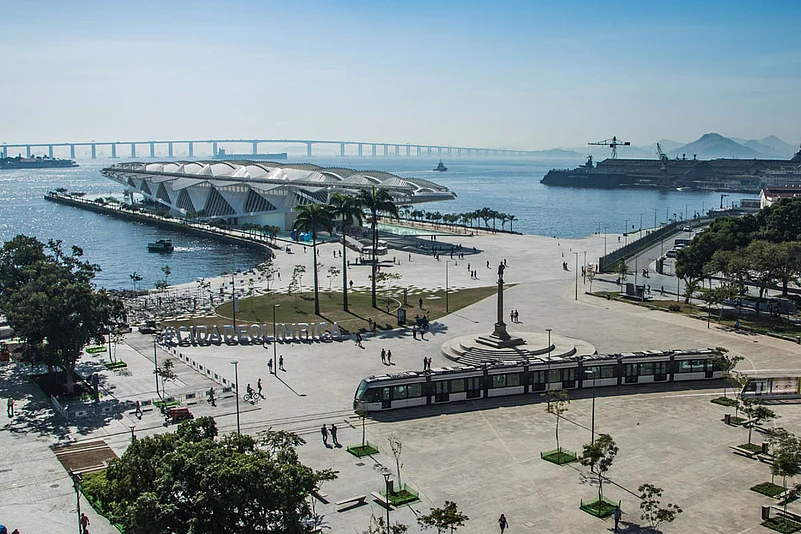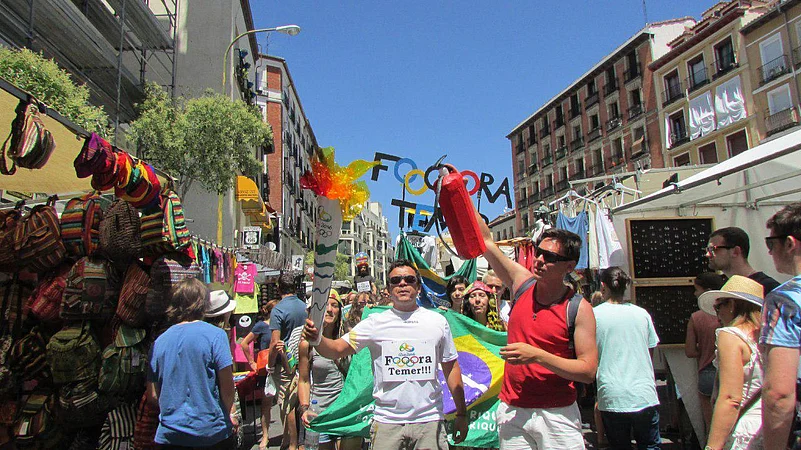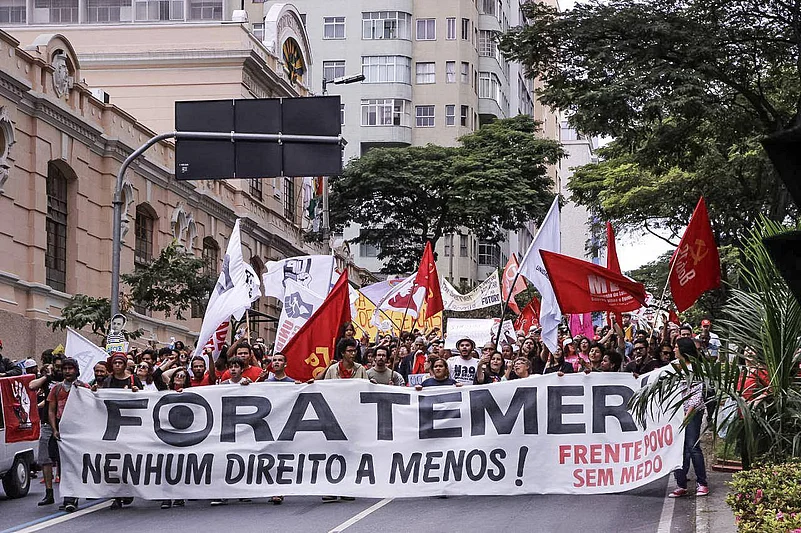With red balloons and banners in their hands and angry slogans on their lips, thousands of Brazilians came out on the streets across the country on Sunday. Loud cries of “Fora Temer” (Temer, out) emerged from the city centres of big and small cities at demonstrations organised by social movements against the country’s interim president, Michel Temer.
Known as the “Butler of horror movies” among friends as well as foes for his political machinations, Temer is a deeply unpopular figure. With his popularity ratings languishing at less than 5%, the wily old politician is working overtime to make the Olympics 2016 a grand success to boost his chances of staying in office till 2018 so that he can complete the term of President Dilma Rousseff, the country’s first woman president who is facing impeachment.
Advertisement
Technically, Brazil has two presidents at the moment. The one facing impeachment and under suspension, Rousseff, is regaining her lost popularity. And the one in power, Temer, is desperately clinging on to power as the country is in a mood for fresh elections.
With Rousseff deciding to stay away from the opening of Rio 2016 on Friday (August 5), Temer wants it to be his show at the iconic Maracana stadium. But with several social movements and left-wing activists promising to protest in front of the Maracana on Friday, one can expect a dramatic beginning to the biggest sporting spectacle on this planet.
Advertisement

Brazil has thrown the kitchen sink at the games but more than 60 percent of the population is not looking forward to the games.
Empty Stadiums in Football Nation
Blame it economic downturn or the social divisions caused by a political crisis that led to the impeachment of the country’s leftist president, Brazil is in such a sombre mood these days that even a game of football is not able to spark any excitement in the “Country of Football”. On Friday, the U-23 teams of South Korea and Sweden played a friendly in the beautiful municipal stadium of Sao Paulo.
With players like Son Heung-min, who played for Tottenham in the last season of EPL, in the Korean team, a good crowd was expected at the stadium in the heart of the city with a population of 21 million. But the organisers managed to sell very few tickets. Fearing a complete flop, a Korean firm stepped in and bought all the tickets of the game, offering it free to anyone who wanted to see the match and cheer for their team. Even then the teams played in front of empty seats. With a number of football games for the Olympics lined-up in the city, the organisers are having sleepless nights over unsold tickets.
Advertisement
Tackling Terror, Brazilian Style
On July 21, less than 15 days before the official opening of Rio 2016, Brazil’s interim justice minister Alexandre de Moraes claimed that the federal police have busted an Islamic State cell that was planning to carry out attacks during the games in Rio. As details of the case came out, it emerged that all 10 arrested men were just members of some social media and phone-based app groups and had even not met each other.
Though the minister claimed the men certainly belonged to the Islamist group, the judge before whom the suspects – all Brazilians -- were produced was not in a hurry to pass a judgment and asked for caution in declaring them as terrorists. But as the men were sent to a maximum-security facility, the arrest made headlines across the world and with it came cancellation of many hotel reservations and flight tickets by foreign tourists.
Advertisement
With the Zika virus and Rio’s rising crime graph already keeping many foreign visitors from the Brazilian city, now the government is trying to show that there is no terror threat. This week, the justice minister was busy vehemently denying rumors of the existence of another terrorist group. “There is no second group,” he told reporters.
No worries about national pride
It’s a déjà vu, all over again. Brazil is in the grip of a pessimistic mood, just as it was before the kick-off of the Fifa World Cup 2014. There were angry protests and violence in the run up to the football tournament. But, despite Brazil’s 1-7 loss to Germany, it was called the “best World Cup ever”. But there is a clear difference this time.
Advertisement
With the games being limited to just Rio de Janeiro, a city of 6 million people, the majority of 200 million people in this country are not really looking forward to the sporting spectacle. In 2014, a poll on the expectations of Brazilians for the World Cup had showed 43 per cent believed that the matches would bring benefits to the country, while 40 per cent believed in losses.
Now, a poll conducted less than 10 days before the start of the Olympics shows that the majority of Brazilians (60 per cent) believe that the Olympics will be more harmful than beneficial for the country. The survey also revealed that Brazilians would rather have a successful event than see Brazilian athletes win medals. The Brazilians are not certainly worried about national pride.
Advertisement

A protest against the country's interim president in Rio."
Chasing the Curry in Rio
Athletes, coaches, officials and journalists from all over the world have started arriving in Rio, the Marvellous City as it’s called by the local residents. Apart from its silvery beaches and green hills, they have been busy discovering the city’s touristy spots and tasting the local delicacies.
Unlike Sao Paulo, which is very cosmopolitan and gastronomical capital of Brazil, the food in Rio is mostly Brazilian. But hardly anybody is complaining about the Brazilian staple diet of feijoada – stewed beans in a pork or beef gravy, accompanied by crisp potatoes, crunchy pork cracklings and rice, especially those made in the small food joints in favelas (slums).
Advertisement
Everybody has been relishing it. Everybody, except a group of Indians. The small Indian contingent already in the Olympic Village and some tourists have been hunting for an Indian curry house in the city. There is none. But some of them have managed to find a couple of Indian families which deliver home-made food. So, packets full of butter chicken, Mangalorean chicken curry, palak paneer, chole masale, naans and other Indian dishes are being delivered by these families to Indian visitors in Rio. They hope to make the best of this demand for curry.




















